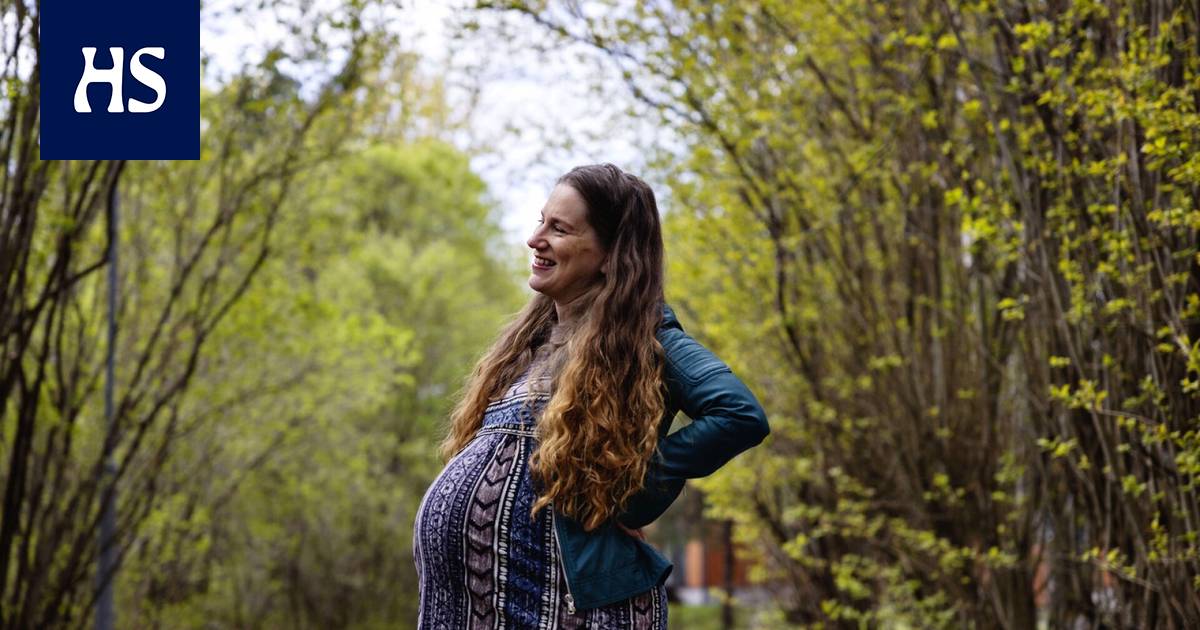Since 2010, child access has decreased in all age groups except women over 40 years of age.
When from Helsinki Krista Aholan45, menstruation suddenly missed a year ago, her husband Joel Sammallahti first thought menopause had begun. It turned out that Ahola was pregnant.
Even though the pregnancy was going through, it made the couple wonder if it would still be too late to try more children.
Now the couple is expecting their third child. The calculated time is in July. The couple already has 10- and 8-year-old daughters.
“I know we are terribly lucky because pregnancy is not possible for everyone at the age of 45, but apparently we had,” Ahola says.
The couple has not been treated for infertility.
The couple the previous children were born when Ahola was 35 and 37 years old. She says she thought for a long time that she wouldn’t want to have children at all.
“I lived an urban, free life where I was only responsible for myself. I lived in Punavuori and traveled a lot. ”
However, after meeting his current partner, he changed his mind.
“For many, it might have been a bit of a surprise when we talked about the firstborn,” Ahola says.
Ahola, who works in the communications industry, started writing about her familyization with Puutalobaby–names blogiawhich later became a part-time job for him.
In her blog, she has written openly about her family life but also about her miscarriage and more recently about her pregnancy. She says she has received a lot of private messages from other women over the age of 40 who are pregnant or still dreaming of getting pregnant.
“Many say they feel outsiders and don’t get peer support.”
Finns women have children not only at a later age but also less than before. This is evident from a recent study by the Flux research project, which examined birth trends between 1990 and 2018.
Since 2010, child access has decreased in all age groups except for women over the age of 40, says the dissertation researcher Julia Hellstrand From the University of Helsinki.
“It is likely that fewer children will be born throughout the life of women than before.”
In the 30-39 age group, for example, child access fell for the first time since the 1970s. At the same time, women’s access to children under the age of 30 also declined faster than before.
Yet In the mid-2000s, children aged 25–29 had the highest number of children. Since then, most children have had 30-34 year olds. Access to children has been postponed and postponed.
Ahola’s story shows quite typical reasons for postponing childbearing. The single biggest reason for postponing childcare is that you still want to do other interesting things, like travel.
The employment situation of young adults is also affected, as many want to postpone having children until they have reached the position they want in working life. Economic reasons also play a role, says the postdoctoral researcher Jessica Nisén From the University of Turku.
“If we want to influence the birth rate, we need more than just social support for existing families with children,” says Nisén.
“While they are important, in addition to them, it is important to try to support, for example, the setting up of a family with young people in financial difficulties.”
Coronary pandemic During Finland, the birth rate in Finland was rising again. Although birth rates collapsed in many other countries, the Nordic countries did the opposite. In addition to Finland, birth rates increased in Norway, Denmark and Iceland.
Read more: Corona-era baby boom continued to rise – birth rates rose even more last year than in the early days of the pandemic
Fertility is often viewed in terms of total fertility. It tells you how many children a woman would have on average in her lifetime if the birth rate remained at the level of the accounting year.
In Finland, overall fertility declined sharply in the 2010s. In 2010, 1.87 children were born per woman. The baseline readings were in 2019, when 1.35 children were born per woman.
During the pandemic in 2020, total fertility turned to a slight increase: 1.37 children were born per woman in Finland. In 2021, growth continued. Birth rates increased especially in women over 30 years of age.
Nisén says it is still too early to say how the birth rate will continue to evolve. In January – March this year, only 90 more babies were born than at the same time in 2019.
Read more: Only 90 babies more than at the worst time – Birth rates at the beginning of the year collapsed again close to bottom levels
Read more: Despite the pandemic, more babies were born last year than a long time ago – Researcher says what will affect the birth rate in the future
The total fertility rate as a measure is also prone to changes in the timing of childbearing and does not tell us directly about the final number of children.
Final the number of children refers to the number of children that women born in a given period have on average during their lifetime.
The final number of children can only be measured at the end of childbearing age. Therefore, it will be a long time before the final number of children of women of childbearing age can be accurately estimated.
However, researchers predict that the final number of children will decline significantly for the first time in three decades.
“The strength of the decline depends on the forecasting method and the underlying assumptions. In any case, the final number of children per woman is likely to fall well below 1.75 for nearly two children, ”says Hellstrand.
Krista Ahola estimates that the couple is now more ready as a parent than when the firstborn was born.
What kind then is having a child at the age of 45? Ahola says she is aware of the risks that age brings. However, she has been a little surprised that she has not been treated as a risk-taker in Finland.
“I’ve been trying to remind the clinic that hey, I’m already 45 years old. The professionals have only said that there is nothing to worry about here, because the pregnancy has gone well, ”says Ahola.
After all, she underwent an ultrasound examination of early pregnancy as well as a fetal screening examination on the private side before structural ultrasound. Because of a previous miscarriage, she only dared to rejoice in her pregnancy.
As a parent, Ahola says she is now more prepared than before. In the case of the firstborn, the couple had no previous experience with children. Another child was born in the middle of a sleep deprivation when the firstborn was a toddler.
“Now we have successfully raised two children from school age and we may be able to see that we seem to be able to raise good guys,” Ahola says.
#Birth #rate #Krista #Ahola #suddenly #missed #period #man #suspected #menopause #truth



/s3/static.nrc.nl/wp-content/uploads/2024/04/web-2504binassiddieq.jpg)




